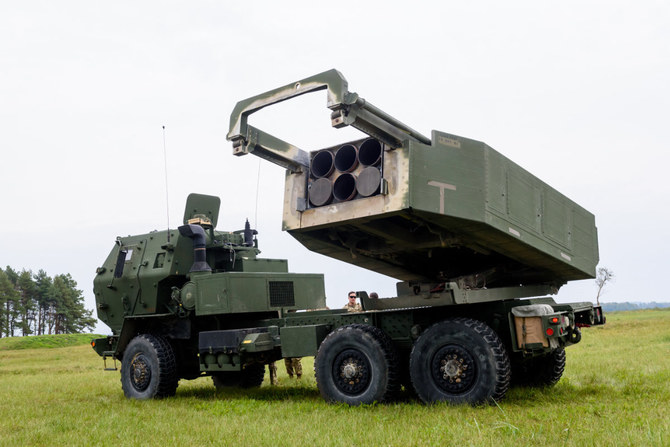WASHINGTON: The US announced a new $400 million package of military aid for Ukraine on Friday, as Kyiv struggles to hold off advances by Russian troops in the northeast Kharkiv region.
This is the third tranche of aid for Ukraine since Congress passed supplemental funding in late April after months of gridlock. Ukrainian President Volodymyr Zelensky had warned Thursday that his country was facing “a really difficult situation” in the east, but said a new supply of US weapons was coming and “we will be able to stop them.”
The package includes High Mobility Artillery Rocket Systems and rockets for them, as well as munitions for Patriot and National Advanced Surface-to-Air Missile Systems, artillery, anti-aircraft and anti-tank munitions, and an array of armored vehicles, such as Bradley and Mine Resistant Ambush Protected vehicles.

It will also provide a number of coastal and riverine patrol boats, trailers, demolition munitions, high-speed anti-radiation missiles, protective gear, spare parts and other weapons and equipment. The weapons are being sent through presidential drawdown authority, which pulls systems and munitions from existing US stockpiles so they can go quickly to the war front.
White House national security spokesman John Kirby said Friday that the latest military aid was intended, in part, to help Ukraine fend off the surging Russian effort to capture Kharkiv, Ukraine’s second largest city.
Kirby noted that Russia has already launched initial incursions into areas around the towns of Vovchansk and Lyptsi, near Kharkiv.
“It is possible that Russia will make further advances in the coming weeks, but we do not anticipate any major breakthroughs,” Kirby said. “And over time, the influx of US assistance will enable Ukraine to withstand these attacks over the course of 2024.”
The US has now provided about $50.6 billion in military assistance to Ukraine since Russia invaded in February 2022.
Almost immediately after President Joe Biden signed the $95 billion foreign aid package, the Pentagon announced it was sending $1 billion in weapons through that drawdown authority,. And just days later the Biden administration announced a $6 billion package funded through the Ukraine Security Assistance Initiative, which pays for longer-term contracts with the defense industry and means that the weapons could take many months or years to arrive.
Russia has sought to exploit Ukraine’s shortages of ammunition and manpower as the flow of Western supplies since the outbreak of the war petered out while Congress struggled to pass the bill. Moscow has assembled large troop concentrations in the east as well as in the north and has been gaining an edge on the battlefield, Zelensky said.
Officials did not say if the latest package includes more of the long-range ballistic missiles — known as the Army Tactical Missile System — that Ukraine has repeatedly requested. The US secretly sent a number of the missiles to Ukraine for the first time this spring and the White House has said it would send more. In one case, Ukraine used them to bomb a Russian military airfield in Crimea.
The new missiles give Ukraine nearly double the striking distance — up to 300 kilometers (190 miles) — than it had with the mid-range version of the weapon that it received from the US in October.

























